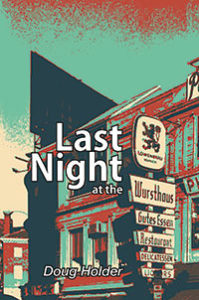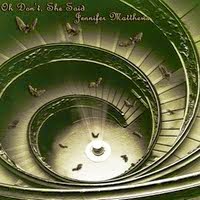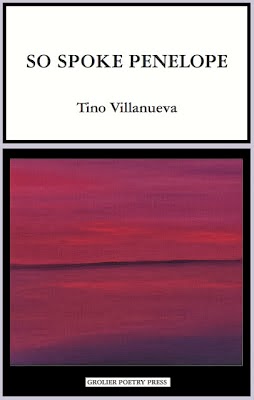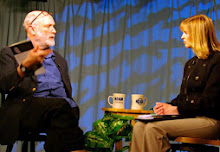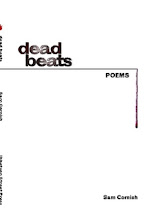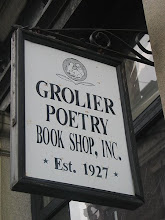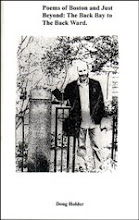The Red Letters
In ancient Rome, feast days were indicated on the calendar by red letters.
To my mind, all poetry and art serves as a reminder that every day we wake together beneath the sun is a red-letter day.
––Steven Ratiner
Red Letter Poem #188
Maybe
for Craig
Maybe it was the billboards promising
paradise, maybe those fifty-nine miles
with your hand in mine, maybe my sexy
roadster, the top down, maybe the wind
fingering your hair, sun on your thighs
and bare chest, maybe it was just the ride
over the sea split in two by the highway
to Key Largo, or the idea of Key Largo.
Maybe I was finally in the right place
at the right time with the right person.
Maybe there’d finally be a house, a dog
named Chu, a lawn to mow, neighbors,
dinner parties, and you forever obsessed
with crossword puzzles and Carl Jung,
reading in the dark by the moonlight,
at my bedside every night. Maybe. Maybe
it was the clouds paused at the horizon,
the blinding fields of golden sawgrass,
the mangrove islands tangled, inseparable
as we might be. Maybe I should’ve said
something, promised you something,
asked you to stay a while, maybe.
––Richard Blanco
“And now we welcome the new year, full of things that have never been.”
––Rainer Maria Rilke
If only. Even a quick glance at today’s headlines––fulminating with news about: ongoing wars; intensified political division (not only in the US but globally); uncertain economic predictions; and a persistent sense of anxiety which the holidays could only momentarily assuage––will stand in stark contrast to such a hopeful attitude. But this oft-quoted extract (from a letter the great German poet wrote to his wife Clara in 1907) is typical of the avalanche of bon mots and uplifting aphoristic lines that pop up in the media near the end of each year. It’s a testament, perhaps, to how badly we wish to believe that we are always given a new chance––to change our own fate if not that of the beleaguered planet. Here’s another quotation I believe I read in an op-ed last year, as pandemic-stressed 2022 dragged itself to a close: “What a wonderful thought it is that some of the best days of our lives haven't even happened yet.” The uplifting intent of the commentator had to be tempered, of course, when we considered the source (Anne Frank) and the circumstance (penned in her diary while in hiding from the Nazis) behind this observation. Still, I love that the teenaged girl believed in this idea, while all around her the world seemed hellbent on destruction. Perhaps she was simply echoing Ralph Waldo Emerson ("Write it on your heart that every day is the best day in the year”), determined to make a glory of any day in which armed soldiers did not come crashing into her life. There are many right now in Ukraine, Sudan, Gaza who would understand that sentiment.
So, in hunting for a poem to help welcome 2024 for Red Letter readers, I wanted a piece in which hope as well as clear-eyed observation genuinely coexisted. Fortunately for me, I was given permission to reprint a selection from Richard Blanco’s Homeland Of My Body: New & Selected Poems, recently issued by Beacon Press. And I happily settled on one of my favorite love poems from this distinguished writer: author of a dozen award-winning books of poetry and memoir; the first-ever Poet Laureate of Miami-Dade County; and, uniquely, the youngest and the first Latinx, immigrant, and gay person to serve in the role of Presidential Inaugural Poet, chosen by Barack Obama in 2013. More recently, President Biden said this of Richard in conferring upon him the National Humanities Medal: “An engineer, poet, Cuban American… his poetry bridges cultures and languages––a mosaic of our past, our present, and our future––reflecting a nation that is hectic, colorful, and still becoming.”
“Maybe” appears to be a blissful memory of falling in love, driving south into the Florida Keys, where the simplest elements of landscape and circumstance feel like nothing less than a benediction conferred. But then there’s that litany of maybe’s. . . And we realize that there are many ways of interpreting an individual situation, of assessing the accuracy of desire. “Maybe/ it was. . .the blinding fields of golden sawgrass,/ the mangrove islands tangled, inseparable/ as we might be.” Every moment is conditional, depending on how much self-knowledge we bring to bear, and how much vulnerability we are willing to risk. This could be the brink of a new year, a new life, a radical departure. But love’s compass is, admittedly, not the easiest one to follow. “No matter how hard the past, you can always begin again.” So said the Buddha who, I believe, never owned a convertible roadster but understood quite well what drives the human heart.
Red Letters 3.0
* If you would like to receive these poems every Friday in your own in-box – or would like to write in with comments or submissions – send correspondence to:
steven.arlingtonlaureate@gmail.com
* To learn more about the origins of the Red Letter Project, check out an essay I wrote for Arrowsmith Magazine:
https://www.arrowsmithpress.com/community-of-voices
and the Boston Area Small Press and Poetry Scene
http://dougholder.blogspot.com
* For updates and announcements about Red Letter projects and poetry readings, please follow me on Twitter
@StevenRatiner









